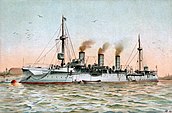|
Featured list tools: |
April 1
There are 34 species of birds that have been recorded living in the wild on Nauru, a small atoll in the Pacific Ocean with an equatorial climate. One species is endemic to the island, two were introduced by humans, and one, the zebra finch, is now locally extinct on Nauru. Out of the 25 species of birds that have been confirmed to occur natively on Nauru, 18 are non-breeding visitors. Only two land birds, the Micronesian imperial pigeon (example pictured) and the Nauru reed warbler, breed on Nauru. The island's environment has been described as one of the world's most modified due to surface mining for phosphate, bombing during World War II, and rapid urbanisation. Habitat destruction has most likely caused a decline in the numbers of some species, such as the Micronesian imperial pigeon and the black noddy. (Full list...)
April 4
In the 1880s and 1890s, Germany built nine unprotected cruisers in three classes. These ships proved to be transitional designs, and experience gathered with them and a series of avisos helped to produce the first light cruisers of the German Navy. The unprotected cruisers, generally designed for service in Germany's colonial empire, required great endurance and relatively heavy firepower. The first ships of the type, the two Schwalbe-class cruisers, were acquired in an effort to modernize an aged cruiser force that relied primarily on old sail frigates. All nine cruisers served extensively in Germany's colonies and foreign interests, particularly in Africa, Asia, and the Pacific. They participated in the suppression of numerous rebellions, including the Abushiri revolt in German East Africa in 1889–90, the Boxer Rebellion in China in 1900–01, and the Sokehs rebellion in the Caroline Islands in 1911. Most of the ships were recalled to Germany and decommissioned by the early 1910s, having been replaced by newer light cruisers. (Full list...)
April 8
There have been 54 champions of the Masters Tournament, a golf competition that was established in 1934, with Horton Smith winning the inaugural tournament. The Masters Tournament is the first of four major golf championships to be played each year. The champion receives the "Green Jacket", the first one being won by Sam Snead in 1949. The champion takes the jacket home for a year and returns it thereafter. Jack Nicklaus (pictured) holds the record for the most Masters victories, winning the tournament six times during his career. Nicklaus is also the oldest winner of the Masters: he was 46 years old when he won in 1986. Nicklaus, Nick Faldo, and Tiger Woods jointly hold the record for most consecutive victories, with two each. The lowest winning score, 268 (20 under par), was recorded by Dustin Johnson in 2020. Hideki Matsuyama is the most recent champion, having won the 2021 Masters Tournament with a score of 278 (10 under par). (Full list...)
April 11
The country of Georgia has four sites on the list of World Heritage Sites, and a further fourteen on the tentative list. The United Nations Educational, Scientific and Cultural Organization (UNESCO) designates World Heritage Sites of outstanding universal value to cultural or natural heritage which have been nominated by countries which are signatories to the UNESCO World Heritage Convention, established in 1972. Georgia ratified the convention on 4 November 1992. The first two Georgian sites inscribed on the list were the Historical Monuments of Mtskheta and the site comprising Bagrati Cathedral and Gelati Monastery (pictured), in 1994. However, due to major reconstruction detrimental to its integrity and authenticity, Bagrati Cathedral was placed on the List of World Heritage in Danger in 2010 and then delisted as a World Heritage Site in 2017. Upper Svaneti was listed in 1996 and the most recent site listed was the Colchic Rainforests and Wetlands, in 2021. The latter is the only site of natural heritage in Georgia, the other three are of cultural heritage. (Full list...)
April 15
Fractional currency, also referred to as shinplasters, was introduced by the United States federal government following the outbreak of the Civil War. These low-denomination banknotes of the United States dollar were in use between 21 August 1862 and 15 February 1876, and issued in denominations of 3, 5, 10, 15, 25, and 50 cents across five issuing periods. The complete type set is part of the National Numismatic Collection, housed at the Smithsonian Institution's National Museum of American History. The design of the first issue (postage currency) was directly based on the original handmade examples of United States treasurer Francis E. Spinner (pictured on banknote). Some varieties even had a perforated stamp-like edge. While not considered a legal tender, postage currency could be exchanged for United States Notes in five-dollar lots and were receivable in payment of all dues to the United States, up to five dollars. (Full list...)
April 18

The discography of the Filipino band Ben&Ben comprises two studio albums, one extended play (EP), 29 singles, five promotional singles, and one charity single, under the record labels of Sony Music Philippines and Sindikato. The band was formed as the Benjamins in 2015 by Paolo and Miguel Benjamin Guico, debuting with the single "Tinatangi". In 2016, it was renamed Ben&Ben, an eponymous EP was released, and they expanded to a nine-piece ensemble. It achieved recognition in 2018 for incorporating songs into films and television series. Ben&Ben's debut studio album, Limasawa Street, was released in 2019, and its second, Pebble House, Vol. 1: Kuwaderno, was released in 2021. In addition to receiving various accolades, the band has set various streaming milestones, and was further popularized in 2020 by positive reviews from K-pop artists. It was reported in 2021 to be the most-streamed folk-pop artist. In addition to singles, Ben&Ben has also released music videos for many of their songs, and collaborated with various artists. (Full list...)
April 22

The U.S. state of Colorado has twenty-one statistical areas that have been delineated by the Office of Management and Budget (OMB). Statistical areas are important geographic delineations of population clusters used by the OMB, the United States Census Bureau, planning organizations, and federal, state, and local government entities. On March 6, 2020, the OMB delineated four combined statistical areas, seven metropolitan statistical areas, and ten micropolitan statistical areas in Colorado (map pictured). The most populous of these statistical areas is the Denver–Aurora, CO Combined Statistical Area, with a population of 3,623,560 at the 2020 census. (Full list...)
April 25

The 72nd Primetime Emmy Awards honored the best in American prime time television programming from June 1, 2019, until May 31, 2020, as chosen by the Academy of Television Arts & Sciences. The ceremony was originally to be held at the Microsoft Theater in Los Angeles, California, but due to the COVID-19 pandemic, it was instead hosted from the Staples Center, while winners gave speeches remotely from their homes or other locations. It aired live on September 20, 2020, following the 72nd Primetime Creative Arts Emmy Awards on September 14–17 and 19. During the ceremony, Emmy Awards were handed out in 23 categories. At the main ceremony, Schitt's Creek won all seven comedy categories including Outstanding Comedy Series, becoming the first comedy series to complete a sweep of those categories. Succession and Watchmen each won four awards, including Outstanding Drama Series and Outstanding Limited Series, respectively. (Full list...)
April 29
The chancellor of Austria is the head of government of Austria, appointed by the president and viewed as the country's de facto chief executive. The chancellor chairs and leads the Cabinet, which also includes the vice-chancellor and the ministers. Following World War I, the office was established by the Provisional National Assembly on 30 October 1918 and named state chancellor of the Republic of German-Austria, and its first holder, Karl Renner, was appointed by the State Council. Since the institution of the republic, the People's Party and the Social Democratic Party have largely dominated Austrian politics; the People's Party (and its predecessor, the Christian Social Party) have led nineteen cabinets and served as a junior partner in eight, while the Social Democratic Party (formerly the Social Democratic Workers' Party) has led eleven and served as a junior partner in five. Bruno Kreisky (pictured) was the longest-serving chancellor, with more than thirteen years in office, while Arthur Seyss-Inquart was the shortest-serving chancellor, with two days in office, and Walter Breisky was the shortest-serving acting chancellor, with only one day in office. (Full list...)





